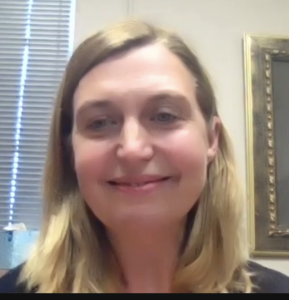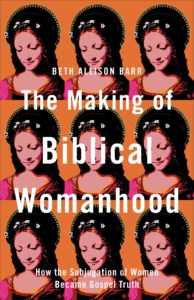White evangelical leaders are revered as modern-day saints by followers supportive of efforts to suppress the voice and visibility of women in the church, Beth Allison Barr said during a May 11 webinar hosted by Baptist News Global.
That constellation of conservative religious figures includes Southern Baptist Theological Seminary president and pundit Al Mohler, Focus on the Family founder James Dobson and California pastor and self-proclaimed culture warrior John MacArthur. Their pronouncements and positions are considered gospel by their supporters, said Barr, Baylor University history professor and author of the new book The Making of Biblical Womanhood.

Beth Allison Barr speaking at the BNG webinar.
“Think about John MacArthur — there are pastors who model their offices to look like his and have pictures of him in their offices, but have never even met him,” she said. Such conservative Christians “claim to adhere to the priesthood of all believers yet have this idea that some people are more worthy than others.”
Barr’s book counters the ideology of complementarianism — a teaching that men and women were created by God for different purposes — with a contextual understanding of the role of women in Christianity that is rooted in history and Scripture. An April 7 excerpt from the book has become a leading BNG opinion piece this year.
Webinar moderator Mark Wingfield, executive director and publisher of BNG, asked Barr a series of questions based on the book and on her teaching and research experience as a scholar of medieval history. The ensuing discussion touched on topics ranging from the SBC’s role in disparaging the role of women and the challenges women face in the wider church culture to the treatment of women in ancient Christian settings and in the Black American church.
The book’s timing
The publication of the book concurrent with high-profile events such as the departure of Beth Moore from the SBC and the recent ordination of three women at Rick Warren’s Saddleback Church in California — as well as the condemnation of those developments by Mohler and other evangelical leaders — was fortuitous but coincidental, Barr said.
 “I’ve been writing blogs according to what’s going on and responding to these things that were happening, and I was following threads about what Beth Moore was doing. Then, of course, Al Mohler and Denny Burk (president of the Council on Biblical Manhood and Womanhood) are a never-ending source of things to write about.”
“I’ve been writing blogs according to what’s going on and responding to these things that were happening, and I was following threads about what Beth Moore was doing. Then, of course, Al Mohler and Denny Burk (president of the Council on Biblical Manhood and Womanhood) are a never-ending source of things to write about.”
Also never-ending are the lengths to which complementarians will go to promote their worldview, Barr said after being asked to share about a student who once challenged her authority to teach in a college setting and suggested she clear her lectures on medieval history with her husband.
“Just the audacity of that. But it makes sense in this culture that says women’s authority is never as good as men’s, so it’s cringeworthy, but it’s also common,” Barr said.
Meanwhile, Barr noted that women have been disqualified from teaching theology courses at some conservative Christian universities while “a lot of the flagship Baptist seminaries don’t let women teach certain classes. This also creates a culture that says a woman’s authority is not as good as a man’s.”
No wonder, Barr added, that some of those who read of her experience said they identified with it. “What’s interesting is other women professors in evangelical universities have reached out and said, ‘Oh, yeah, that happens to me.’”
Links to the SBC’s founding
Patriarchal attitudes are so widespread and ingrained in the SBC because they were so strongly present during the denomination’s founding in the 19th century, Barr said. “In fact, the whole evangelical movement is born in the context of the 17th, 18th and 19th centuries in a white European context, and it’s born in a British Imperial context. We simply cannot step away from that history.”
And the convention’s specific founding as a pro-slavery movement explains its connection to the racism that is so tightly woven into the fabric of white evangelicalism, she added. Hence, the selective reading of Scripture to find passages used to subjugate women and defend slavery and racism.
“It’s really hard to uproot things that are there in the beginning, and patriarchy is there, too. This explains why it’s so hard to separate racism from our evangelical context, because it was there in the beginning.”
“Women were very powerful members in the early Baptist circles, and we know that there were women preaching not only in the Northern Baptist world but in the Southern Baptist world.”
Despite that, the SBC became a force for missionary zeal in the late 19th and early 20th centuries, Barr said, noting that women were leaders in those and evangelistic efforts.
“Women were very powerful members in the early Baptist circles, and we know that there were women preaching not only in the Northern Baptist world but in the Southern Baptist world,” she said. “They were doing it and they were carrying the authority of it and so the Southern Baptist world has this legacy.”
But these “women evangelists were often very racist, too,” she added.
Changes after World War II
Women’s voices began to fade in the SBC with increasingly determined efforts to eliminate their preaching and teaching after World War II, Barr said. “There was an orchestrated effort, and Southern Baptists were part of that. They embraced that wholeheartedly, and that laid the pathway for the conservative resurgence of the late 1970s.”
One of the impacts of the late 20th century conservative movement in the SBC on women, both inside and outside the SBC, was to link any notion of female authority or leadership with an attack on Christian orthodoxy, Barr said.
“One of the core identifiers of this conservative resurgence … was this cultural warrior motif that the family is under attack.”
“One of the core identifiers of this conservative resurgence … was this cultural warrior motif that the family is under attack,” she said. Dobson was one of the leading voices of this “slippery slope” mentality as was the Council on Biblical Manhood and Womanhood.
Their warning: “We’ve got to return to these Christian values and defend the family or the whole things is going to fall apart.”
Those values included the claim that the Bible mandates “male headship and female submission” as the proper family structure, Barr said. “And if you don’t follow this, then your theology falls apart and you leave the faith and Christianity gets watered down.”
Challenging complementarianism
But there is plenty of biblical and historical evidence to undermine complementarian ideologies, Barr said.
One such evidence is the issue of biblical translation, she explained, saying even the male-dominated medieval church used gender-inclusive Bible translations. “They were trying to get men and women to hear them and listen to them.”
When English-language Bibles began being produced, however, the same colonial and patriarchal forces shaping Protestant Christianity were influencing Scripture translation. “The English language itself was being defined and becoming more masculine because men were the political leaders. They were writing for men, and they wrote women out.”
Conservative Christians added another layer of selectivity by focusing on only a few passages to support their views on women, Barr said. “This is not good hermeneutics. I’m tired of this and I want people to see that there is a much broader perspective.”
“When we put Paul in context, and read more than just five or six verses, he reads differently.”
A broader perspective also is needed on the writings of Paul, a favorite for those who seek to marginalize women. But a wider reading of the apostle’s letters and consideration of their historical setting actually undermines the evangelical reading of the passages, she asserted.
“When we put Paul in context, and read more than just five or six verses, he reads differently,” the history professor said. “There is no way he is telling women to be silent for all time. … Paul talks about women who served in ministry alongside him, who served in leadership roles. He’s obviously not doing what evangelicals say he is doing.”
Learning from the Black church
The Black church is one place that historically has known these things, Barr said. “I keep saying, if we would look beyond our white selves, all these ideas about biblical womanhood would just explode.”
Black Baptists have a long history of preaching and teaching women, although there have been cases in which African American churches have adopted white teachings in order to fit in with evangelicals, Barr said. “This has really sped up with a vengeance in the latter half of the 20th century.”
What’s old is new again
Even so, none of these trends are altogether new, an observation Barr said she finds replete in church history.
“Growing up in the Baptist world and serving in church now, I’ve always been struck by parallels between things that I study in the medieval world and in medieval Christians who act, in many ways, very similar to us.”
“I’ve always been struck by parallels between things that I study in the medieval world and in medieval Christians who act, in many ways, very similar to us.”
Scandals involving modern-day megachurch pastors are similar to the papal controversies of ancient times, she said. And there, again, is the issue of conservative Christians coming full circle to pre-Reformation times when saints were highly esteemed.
“The Reformation really disparaged medieval saints and we are no longer to bow down to other people,” she said. “It’s so striking to me that we just create new saints who are just as flawed as us.”
Creedalism and saints
Creeds, an ancient form of loyalty oaths, also have crept into conservative evangelical spaces, including the SBC with its Baptist Faith and Message, she said. “Baptists being credal, to me, is really bad.”
But in a sense, it’s human nature to rigidly follow the teachings of someone like Bill Gothard, whose conservative teachings on family and youth helped him fill stadiums in the 1970s and beyond. “We like to have somebody who can give us the easy answers. He spoke to families who were having problems with their children and he said, ‘I have the magic bullet, this is what you do.’ A lot of these people provide easy answers for us.”
That’s another similarity to the Christianity of earlier times, she said. “The parallels between medieval believers and my evangelical world have always been something that has intrigued me.”
“My testimony doesn’t just include my own story but includes the evidence that convinced me along the way.”
Offering another view that elevates women in the classroom, in blogs and in her book has been a way of sharing her testimony, Barr said. “Our testimony is our language in the evangelical world. It’s how we connect with people, and so I made this book my testimony. My testimony doesn’t just include my own story but includes the evidence that convinced me along the way.”
Barr said she is optimistic about the future for these issues. “The heart of Christianity is redemption. We believe in redemption because we believe in a Savior who was resurrected. And women haven’t given up. We have always continued to fight and preach.”
But she offered a warning: “The dangers that happened in the medieval world are the dangers we are facing now, and there is a lot we can learn from history if we would just pay attention.”
Watch the full webinar here.
Related articles:
I knew the truth about women in the Bible, and I stayed silent | Opinion by Beth Allison Barr
Saddleback, women’s ordination and Jezebels: An open letter to Al Mohler | Opinion by Jonathan Davis
Largest church in SBC ordains three women as pastors
Now Beth Moore is taking on patriarchy in the church
Why Beth Moore’s departure from the SBC really matters | Analysis by Mark Wingfield
Mohler says he’s embarrassed by past support of women in ministry
How John MacArthur loves the Bible but not his neighbor | Analysis by Rick Pidcock


